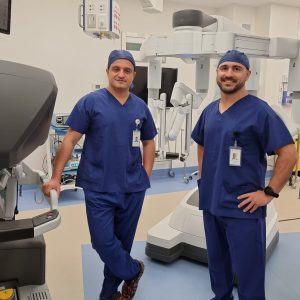At Melbourne Urology Centre, our urologists are highly experienced in kidney cancer diagnosis and treatment. Dr Shekib Shahbaz and Dr Tony de Sousa, together with their team, are committed to providing patients with the highest standard of personalised care.
What is kidney cancer?
Kidney cancer is a disease that affects the kidney. Normal cells begin to grow abnormally and unregulated, forming a growth that is known as a tumour. The most common type of kidney cancer is renal cell carcinoma (RCC).
In most cases of kidney cancer, only one kidney is affected. However, in some rare cases kidney cancer multiple tumours can occur in one kidney or even in both kidneys.
Urothelial carcinoma (also known as transitional cell carcinoma, TCC) is a less common type of kidney cancer. This type of kidney cancer is a malignant tumor that begins in the renal pelvis (inside lining of the kidney) or in the ureter (tube that connects the kidney to the bladder). It is typically treated in a similar way to bladder cancer.
What are the symptoms of kidney cancer?
Kidney cancer in its early stages may not produce any symptoms. In cases where the tumor is large, symptoms may be present including:
- Haematuria (blood in the urine)
- Pain or a dull ache in the side of the lower back
- A lump may be felt in the abdomen
- Tiredness or persistent fatigue
- Unexplained, sudden weight loss
- Fever that is unrelated to a cold or flu.
What are the treatment options for kidney cancer?
The urologists at Melbourne Urology Centre will conduct a thorough assessment and take into account your personal circumstances to determine the most appropriate treatment for you. This assessment includes your overall health, the health of your other kidney, as well as the size and location of the tumour within the kidney.
The most common treatment for kidney cancer which has not spread outside the kidney to other parts of the body (metastasis), is surgery.
There are different types of kidney cancer surgery that might be considered, depending on a number of factors, including:
- The type of kidney cancer
- The grade and stage of kidney cancer
- The patient’s general health and other medical conditions
There are two main types of kidney cancer surgery:
- Radical nephrectomy: The entire affected kidney is removed. This surgery is commonly performed for renal cell carcinomas.
- Partial nephrectomy (kidney sparing surgery): Only the affected part of the kidney is removed. This type of kidney cancer surgery is sometimes offered as an option for patients that have a tumour less than 4cm diameter in one kidney, cancer in both kidneys, or in patients who only have one working kidney.
In patients with kidney cancer that has spread beyond the kidney (metastatic cancer), multiple lines of treatment are often required. These treatments may include immunotherapy, radiotherapy, radiofrequency ablation, or other targeted therapies.
How is kidney cancer surgery performed?
Regardless of the type of kidney cancer surgery the patient is having, it is performed in hospital under general anaesthetic.
There are a number of surgical methods that the urological surgeon may choose to use, depending on the type of kidney cancer surgery the patient is having (ie either radical or partial nephrectomy). Prior to the kidney cancer surgery taking place, the urologists at Melbourne Urology Centre will always take the time to have an in-depth discussion with the patient. They will thoroughly assess the patient’s suitability for a particular type of surgical approach, and the particular advantages and disadvantages of each.
Laparoscopic kidney cancer surgery:
Laparoscopic kidney cancer surgery is performed through small incisions that are made in the abdomen. This is also sometimes referred to as keyhole surgery. Through these incisions, the urological surgeon inserts a laparoscope (small light and camera) and the required surgical instruments. The laparoscope captures images of the inside of the patient’s body and displays them on a screen, and with their guidance, the surgeon performs the procedure.
Robotic kidney cancer surgery:
Robotic-assisted kidney cancer surgery is an advanced type of laparoscopic surgery. A state-of-the-art surgical robot is used to assist the surgeon during this procedure. The robot is completely under the control of the surgeon at all times.
During robotic kidney cancer surgery, small incisions are made in the abdomen, through which the camera and instruments are inserted. The robotic technique allows between 10-12x magnification, giving the surgeon enhanced vision and incredibly precise control of the specialised surgical instruments.
The specialist urological surgeons at Melbourne Urology Centre are fully trained and qualified in performing robotic kidney cancer surgery. Robotic surgery carries a number of benefits for the patient, including less trauma, shorter ischaemia time (partial nephrectomy), less blood loss and a faster recovery.
Open surgery for kidney cancer:
In some cases where a laparoscopic or robotic approach is not appropriate, open surgery may be required for kidney cancer patients. The open surgical technique involves the surgeon making an incision in the abdomen or flank, in order to remove the affected kidney.
Kidney cancer treatment at Melbourne Urology Centre

The specialist urologists at Melbourne Urology Centre are highly experienced in the diagnosis and treatment of kidney cancer. Our staff are committed to providing every patient with the highest standard of specialist urological care, with an individually tailored, patient-focused approach. If you wish to make an appointment with one of the urologists at Melbourne Urology Centre, please telephone our rooms and a member of our helpful administrative team will be able to assist you.
